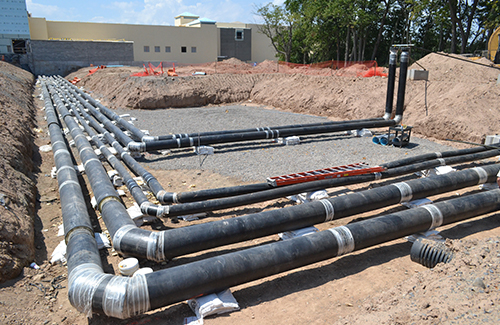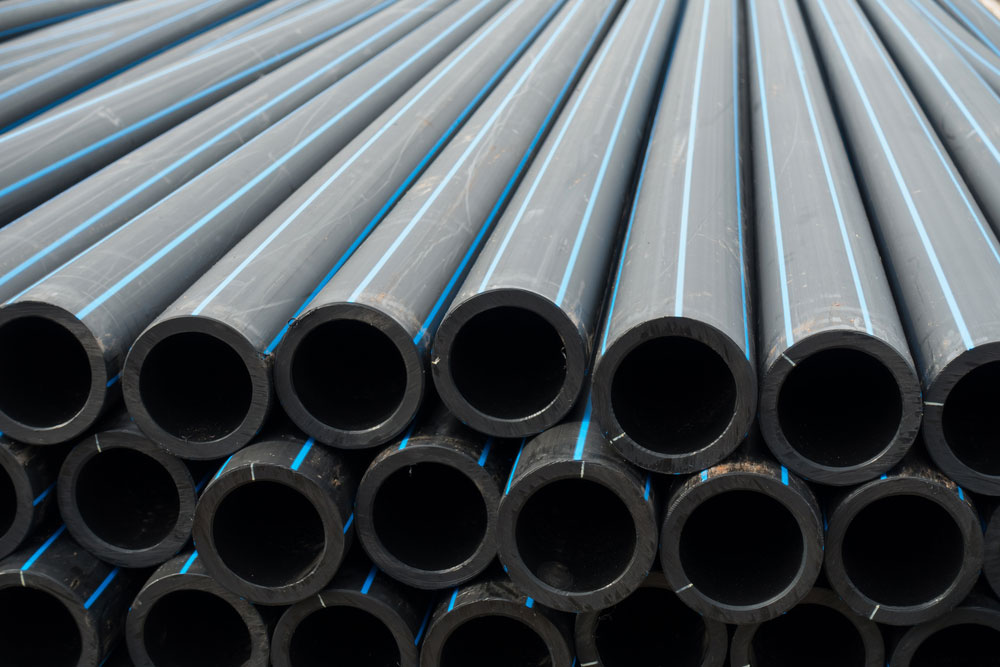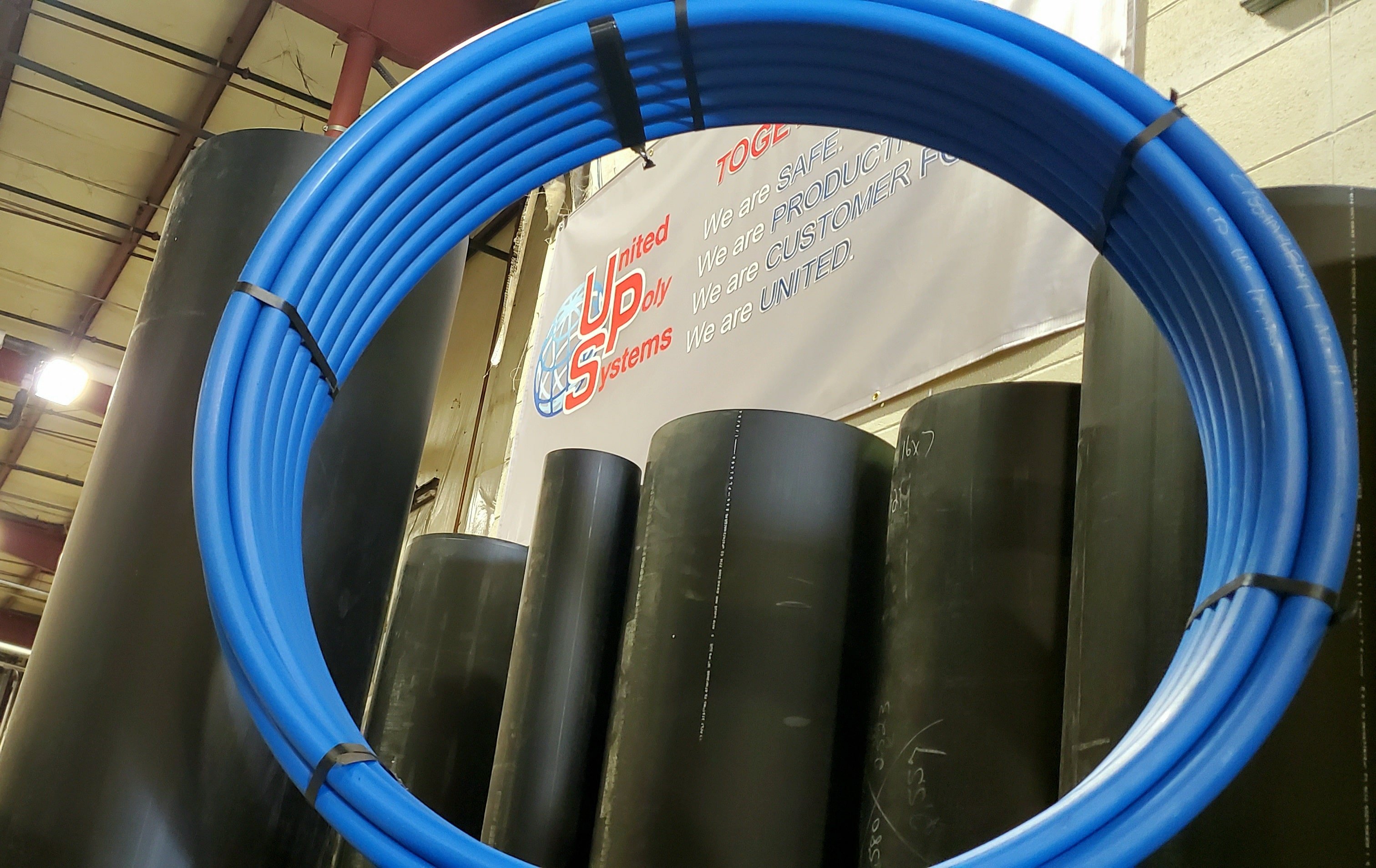HDPE Pipe Supplier explained: how they support infrastructure
Wiki Article
Discovering the Leading Pipeline Manufacturers: Quality, Reliability, and Advancement
The pipeline manufacturing market stands at the intersection of integrity, advancement, and quality, driven by leading firms such as Tenaris and Vallourec. These makers are not only dedicated to generating high-performance materials but are additionally pioneering sustainable techniques that address contemporary environmental worries (Pipeline Manufacturer). As we analyze the criteria that define quality in pipeline remedies, it comes to be obvious that the landscape is swiftly advancing. What particular technologies are arising, and exactly how are these developments shaping the future of pipeline facilities? The solutions might redefine sector standards in ways that are not yet fully recognizedLeading Manufacturers Overview
In the domain name of pipeline manufacturing, a number of principals arise as leaders, each adding considerably to the industry's landscape. Companies such as Tenaris, Vallourec, and JFE Steel have established themselves as frontrunners by constantly supplying high-quality products that fulfill stringent industry criteria. Tenaris, renowned for its cutting-edge remedies, concentrates on smooth and welded pipelines, catering primarily to the oil and gas market. Vallourec, a French international, concentrates on the production of costs tubular services, stressing sustainability and advanced innovation in its manufacturing processes.Similarly, JFE Steel, a major Japanese manufacturer, is recognized for its comprehensive variety of steel pipelines, especially those used in power and framework jobs. Their commitment to study and advancement has allowed them to produce high-performance products that withstand severe ecological conditions. In addition, business like united state Steel and National Oilwell Varco have actually expanded their market existence by diversifying their product offerings and improving operational effectiveness.
These leading makers not only control the market yet additionally drive development within the industry, establishing standards for top quality and integrity that other players aim to achieve. Their payments are important for fulfilling the increasing demand for effective and sturdy pipeline remedies worldwide.
Standards for Top Quality Evaluation
Quality analysis in pipeline manufacturing rests on 2 critical criteria: material durability standards and manufacturing procedure effectiveness. Making sure that materials meet rigorous toughness criteria is vital for the longevity and dependability of pipes. Additionally, maximizing the manufacturing procedure can enhance productivity while maintaining premium quality, eventually affecting general efficiency and security.Material Toughness Requirements
Assuring the long life and dependability of pipeline products is vital for preserving facilities stability and functional effectiveness. Material resilience requirements play a crucial function in assessing the quality of pipelines, dictating the performance and life-span of the materials utilized in building and construction. Manufacturers need to comply with a variety of rigorous criteria, consisting of those set by organizations such as ASTM International and the American Oil Institute (API)These standards evaluate different variables, consisting of rust resistance, tensile strength, and tiredness efficiency. Pipes made use of in corrosive atmospheres call for products that can endure chemical deterioration, while those subjected to high-pressure conditions have to display outstanding tensile toughness.
Additionally, elements such as temperature changes and environmental problems have to be considered, as these can considerably affect product actions over time. Manufacturers frequently make use of advanced screening methodologies, including increased aging tests, to imitate long-term wear and assurance that products meet or go beyond sector benchmarks.
Manufacturing Process Effectiveness
Manufacturers' capacity to optimize producing procedure efficiency is important for generating high-quality pipelines that fulfill stringent industry requirements. Performance in manufacturing directly affects price management, production timelines, and overall item stability. To accomplish this, leading pipeline makers execute innovative techniques such as lean manufacturing, automation, and real-time data analytics.Lean making principles are necessary in minimizing waste and making the most of resource usage. By streamlining procedures and getting rid of redundancies, producers can enhance productivity while making sure constant high quality. Automation innovations, consisting of robotics and computer numerical control (CNC) devices, play a critical role in improving precision and minimizing human mistake, thereby boosting the reliability of the end product.
Additionally, using real-time data analytics permits manufacturers to keep an eye on production processes continually, enabling them to recognize bottlenecks and make timely changes. This positive method not only boosts performance however additionally sustains quality guarantee methods by guaranteeing conformity with regulative requirements.
Reliability in Pipeline Solutions
Reliability in pipeline remedies is extremely important, as it straight influences the safety and security and effectiveness of fluid transportation systems. Secret factors include the toughness of materials utilized, adherence to strenuous screening and certification criteria, and the incorporation of ingenious material options that boost efficiency. Comprehending these elements is vital for makers aiming to deliver dependable pipeline framework.Importance of Toughness
Attaining resilience in pipeline solutions is crucial, as it straight affects the long-term efficiency and safety and security of infrastructure. Long lasting pipes are vital for reducing maintenance costs and minimizing the chance of disastrous failings. This reliability is especially vital in industries such as oil and gas, water supply, and wastewater administration, where the effects of pipeline failure can be serious, both financially and eco.The materials and manufacturing procedures utilized by pipeline producers play a significant duty in establishing the longevity of the end product. Utilizing high-grade basic materials, advanced technologies, and innovative style principles assures that pipelines can endure various stress factors, including stress variations, temperature level variants, and harsh environments.
Additionally, the longevity of pipes is very closely linked to their capability to withstand outside elements such as soil movement, seismic activity, and chemical exposures. Effective rust security methods, such as layers and cathodic protection, additionally improve the longevity of pipes, securing them versus degeneration with time.
Buying durable pipeline solutions ultimately converts to enhanced operational efficiency, lowered downtime, and enhanced security, attesting the important significance of sturdiness in modern pipeline manufacturing.
Evaluating and Accreditation Standards
In the domain of pipeline remedies, strenuous testing and certification criteria are important to assure the dependability and safety of framework. These requirements work as criteria for evaluating the efficiency and longevity of pipeline products and systems, confirming they satisfy specific governing and sector needs.Examining processes normally incorporate different methodologies, including pressure testing, hydrostatic evaluations, and non-destructive screening strategies. These evaluations are necessary for determining potential weaknesses or flaws in the products prior to they are deployed in real-world applications. Furthermore, qualification by recognized organizations assurances that producers follow established guidelines, which cultivates trust among stakeholders, including designers, end-users, and contractors.
Numerous leading pipeline producers participate in continual tracking and renovation of their screening protocols to adjust to progressing sector requirements and technical improvements. Conformity with criteria such as ASTM, ASME, and ISO not only improves product reliability but likewise minimizes the risk of ecological cases related to pipeline failings.
Cutting-edge Product Solutions
The growth of innovative material solutions has actually transformed the landscape of pipeline manufacturing, boosting both performance and longevity. Advanced products such as high-density polyethylene (HDPE), cross-linked polyethylene (PEX), and composite products have emerged as game-changers, supplying exceptional resistance to rust, temperature changes, and stress variations. These products not only extend the lifespan of pipes yet also decrease upkeep prices, guaranteeing reliable long-term performance.Manufacturers are progressively adopting clever products that incorporate sensing units for real-time tracking. This technology enables proactive maintenance, substantially boosting dependability by detecting leakages or architectural weaknesses prior to they escalate right into crucial failings. The combination of nanotechnology has actually additionally led to the development of coatings that enhance the resilience of pipes against abrasion and chemical direct exposure.
Sustainability is another vital emphasis, with manufacturers discovering bio-based compounds and recyclable materials that reduce environmental impact. As regulative criteria remain to develop, the focus on innovative product services ends up being extremely important in conference stringent security and ecological needs. Eventually, these advancements not only enhance the integrity of pipeline systems yet likewise contribute to the total performance and sustainability of energy transport frameworks.
Developments in Pipeline Modern Technology
Advancements in pipeline innovation are transforming the sector by boosting performance, security, and ecological sustainability. Recent advancements concentrate on smart pipeline systems that make use of sensing units and IoT modern technology to keep an eye on conditions in genuine time, enabling positive maintenance and decreasing the danger of failures. These systems can identify leakages, stress changes, and other anomalies, enabling fast action and lessening environmental impact.Additionally, the development of advanced products, such as composite and corrosion-resistant alloys, considerably prolongs the life-span and integrity of pipes. HDPE Pipe Supplier (American Plastics LLC HDPE Pipeline Manufacturer). These materials minimize upkeep expenses and enhance efficiency in rough atmospheres, making them suitable for oil, water, and gas transport
Automation and robotics are playing a crucial duty in pipeline building and construction and evaluation. Drones and robotic tools help with studies and analyses of hard-to-reach areas, making certain comprehensive inspections without jeopardizing safety.
Ingenious layouts, such as modular pipeline systems, enable for greater adaptability in setup and alteration, catering to the vibrant needs of the energy sector. Together, these technical improvements not only boost operational efficiency yet likewise add to a more lasting and durable pipeline infrastructure, paving the means for a greener future.
Situation Studies of Success
Throughout various fields, successful implementations of innovative pipeline innovations show significant improvements in functional efficiency and safety and security. One significant instance is the deployment of wise pipeline tracking systems in the oil and gas sector, where real-time information analytics have actually reduced leak detection times by over 50%. This not just decreases ecological threats but also enhances the general stability of pipeline facilities.
Additionally, a major manufacturer executed robot examination innovations in its pipeline maintenance operations, resulting in a 40% renovation in examination performance. This method has streamlined maintenance schedules and considerably reduced downtime.
These case researches highlight just how top pipeline makers are leveraging cutting-edge technologies to promote reliability and operational quality, ultimately establishing new criteria for the industry. As these successes proceed to unfold, they lead the way for additional advancements in pipeline manufacturing and monitoring.

Ecological Sustainability Practices
Often, pipeline suppliers are prioritizing ecological sustainability techniques to reduce their eco-friendly impact and enhance the durability of their items. This commitment is shown in numerous campaigns focused on lowering waste, saving power, and making use of sustainable materials throughout the manufacturing process.
Several manufacturers are embracing sophisticated innovations that lessen discharges and energy usage. As an example, the assimilation of automated systems and energy-efficient equipment assists enhance production while decreasing dependence on fossil gas. Furthermore, business are progressively transforming to environmentally friendly products, such as recycled steels and bioplastics, which not only reduce the ecological effect but likewise promote a circular economy.
Moreover, pipeline suppliers are applying strenuous lifecycle evaluations to review the ecological implications of their items from creation to disposal. This technique enables them to identify chances for enhancement and foster liable sourcing and waste monitoring methods.
Partnership with ecological organizations additionally improves these efforts, as manufacturers seek to straighten their procedures with global sustainability objectives. Eventually, these environmental sustainability techniques not only add to a much healthier earth but also setting suppliers as accountable leaders in the industry, attracting environmentally conscious stakeholders and clients alike.
Future Fads in Pipeline Manufacturing
As the demand for a lot more efficient and lasting framework grows, pipeline manufacturing is positioned for significant improvements that will certainly reshape the market. Trick trends anticipated in the coming years include the assimilation of advanced products, such as composite and corrosion-resistant alloys, which boost sturdiness while decreasing ecological effect. Manufacturers are additionally expected to embrace cutting-edge production methods, like additive manufacturing and automation, to enhance procedures, reduce waste, and lower prices.Additionally, the surge of clever pipeline technologies, integrating sensors and IoT gadgets, will certainly make it possible for real-time monitoring and anticipating upkeep, thus boosting safety and operational efficiency. This digital makeover will certainly not just enhance resource monitoring yet additionally promote conformity with rigorous ecological guidelines.
Sustainability will remain a central emphasis, driving suppliers to buy eco-friendly practices, consisting of energy-efficient manufacturing approaches and recycling campaigns. As the international focus on climate change magnifies, pipeline suppliers will need to adjust by creating remedies that satisfy both economic and ecological needs.
Frequently Asked Inquiries

What Industries Mostly Utilize Pipeline Products From These Manufacturers?
Pipeline items are largely utilized in industries such as oil and gas, wastewater and water management, chemical handling, mining, and building and construction. original site These markets rely on effective, long lasting, and secure transportation of fluids and materials.
Just How Do Manufacturers Guarantee Compliance With International Pipeline Specifications?
Manufacturers assure conformity with international pipeline standards by applying strenuous top quality control processes, conducting regular evaluations, adhering to well established governing structures, and purchasing employee training to promote awareness and understanding of safety and quality requirements.What Is the Average Lifespan of Pipelines From Leading Manufacturers?
The average lifespan of pipelines from leading manufacturers generally ranges from 30 to 100 years, depending on material, environmental problems, and upkeep methods. Permian Basin HDPE Pipe Supplier. Normal assessments and adherence to market standards considerably affect long life and performanceAre There Certifications Specific to Pipeline Production High Quality?
Yes, various qualifications exist for pipeline producing quality, consisting of ISO 9001 for high quality management systems and API requirements particular to pipes. These accreditations guarantee adherence to strenuous security, efficiency, and ecological standards within the market.How Do Manufacturers Deal With Pipeline Upkeep and Repairs?
Manufacturers usually execute an aggressive maintenance strategy that includes regular assessments, checking systems for very early discovery of problems, and a structured fixing method. This technique warranties pipeline integrity, reduces downtime, and improves general operational efficiency.Quality evaluation in pipeline manufacturing pivots on two important standards: material toughness standards and manufacturing procedure performance - HDPE Pipe Supplier. Material durability criteria play an important role in examining the top quality of pipes, determining the performance and life-span of the materials used in building. The materials and manufacturing processes used by pipeline producers play a considerable function in establishing the longevity of the final item. The ordinary lifespan of pipelines from leading manufacturers usually varies from 30 to 100 years, depending on material, environmental conditions, and maintenance practices. Yes, various certifications exist for pipeline manufacturing quality, consisting of ISO 9001 for top quality monitoring systems and API standards particular to pipelines
Report this wiki page